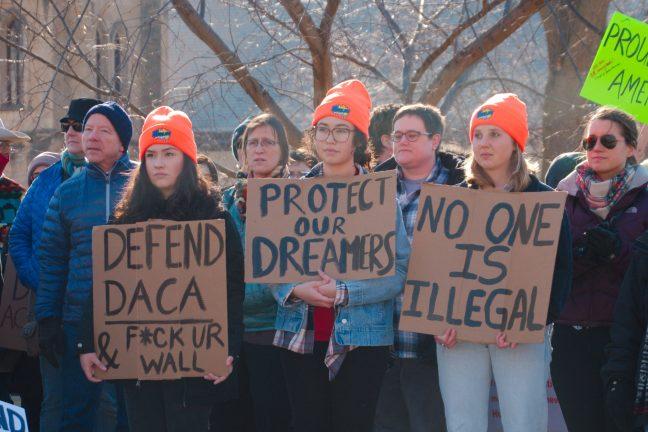Last week, the president announced he was considering an executive order to end birthright citizenship for the children of unauthorized immigrants. The stakes of this order, if it is given, are tremendous. Birthright citizenship is essential to our multicultural democracy — which is exactly what the president hates about it. Threatening it violates the deeply held ideal that anyone born here, regardless of their race, class, ethnicity or their parents’ citizenship status is a citizen. This announcement is a brazen continuation of racist, anti-immigrant rhetoric that swept his administration to power. If we want a citizenry that reflects this country’s diversity, we need to defend birthright citizenship.
Universal birthright citizenship, which is included in the first section of the fourteenth amendment, guarantees that any child born in the territorial U.S. is a citizen. Passed by Congress as part of the 1866 Civil Rights Act and ratified by the states two years later, the amendment was a response to recently enslaved African-American demands for citizenship. The amendment superseded the Dred Scott decision which had denied citizen status to African Americans. Of its passage, George William Curtis, editor of Harper’s Weekly magazine, wrote it had transformed the constitution from a document serving “white men” to a document serving all “mankind.”
White men have wanted “their” document back ever since.
For the last few decades, a fringe group of conservative legal scholars has argued the birthright citizenship clause is being misinterpreted. According to them, the phrase “subject to the jurisdiction thereof” intended to exclude the children of unauthorized immigrants. Only children of people “subject to the jurisdiction” of the U.S. government — citizens, lawful permanent residents or documented immigrants — should be allowed to claim birthright citizenship.
References to “anchor babies” and “chain migration” are the mainstream, racially explicit extension of this argument. So is challenging the citizenship of the first African American president by suggesting he wasn’t born here.
The true intention of the “subject to the jurisdiction thereof” clause was to exclude two classes of people writes Garrett Epps, an American legal scholar. One was Native Americans “living under tribal government on reservations” and the other was the “children of public ministers — what we would call diplomats today.”
Most legislative histories agree the clause had nothing to do with the children of unauthorized immigrants.
Despite this, Vice President Mike Pence argued the executive order has legal standing because the Court has never ruled on whether the clause “subject to the jurisdiction thereof” applies to “people who are in the country illegally.” He went on to say this administration was fulfilling a campaign promise to challenge “American law that may be used as a magnet to draw people into our country.”
Never mind the fact being in the country, absent any previous removal order or unauthorized reentry is a misdemeanor, not a crime.
The conservative message is abundantly clear — we don’t want immigrants, and we don’t want their children. And we don’t want them so much we will strip this country of anything they might come here looking for, even if that means depriving rightful citizens what is guaranteed to them by the constitution.
The worst part is, Pence is right about one thing. The Supreme Court has never specifically ruled on whether birthright citizenship applies to the children of unauthorized immigrants. While the court has long affirmed the fourteenth amendment applies to children whose parents are non-citizens, it has never been asked whether it applies to the children of unauthorized immigrants.
The president and vice president’s words should scare anyone who remotely cares about birthright citizenship, any unauthorized immigrants or the sanctity of the constitution.
They are suggesting this clause should be ruled on by the Supreme Court, a court who is increasingly out of step with popular opinion and willing to toss out precedent in civil and immigrant rights cases. Presumably, this order would direct federal agencies not to recognize the citizenship of children of any non-citizens born in the U.S., which would almost certainly invite legal challenges. Some scholars are optimistic the order would not survive judicial scrutiny, but this is far from certain. It is equally feasible that the court would defer to the administration and let them deport and brutalize rightful citizens.
The Constitution is remarkably vague on who is, or who may be, a citizen of this country — this is a good thing. It means that the question is left up to us. Citizenship is how we choose to define it, and we should strive for the broadest possible definition. If we want a diverse, multicultural citizenry — an ever-expanding community that transcends the boundaries of race, ethnicity, religion and class — we will not put blind faith in judicial scrutiny. We will mobilize to defend birthright citizenship, to ensure this document serves all of humankind.
Sam Ropa (ropa@wisc.edu) is a senior studying geography and anthropology.


